
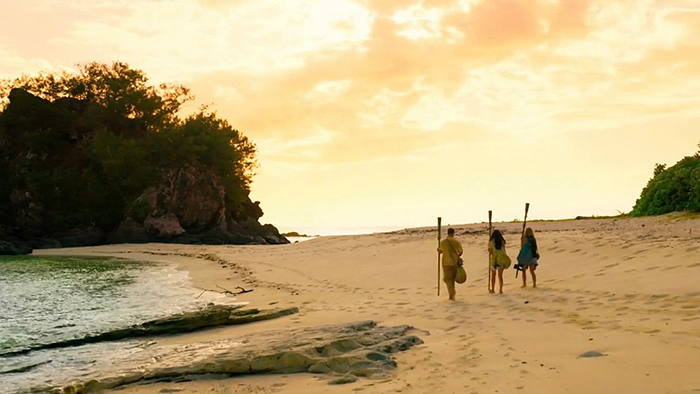
If there was a big surprise in Episode 14 of Survivor 47, it was mostly that the show's description of it as the "second half of the finale" turned out to be completely accurate. Rather than a conclusion that caught people by surprise, it really was just the continuation and completion of the story that started in Episode 13: The story of Rachel's victory.
So it was a little anti-climactic. When Rachel won the final immunity challenge 18 minutes into Ep14's two-hour run, it felt like you could probably just fast-forward directly to the Aftershow. If you had, you would have taken the 7-1-0 jury vote in her favor as evidence that this was the right choice.
To be fair, things did briefly get more complicated and nebulous in between. Sam miraculously survived F4 fire-making (despite never having practiced before) and his Final Tribal Council performance did create reasonable doubt about the outcome. At the time the votes were revealed, it looked like Sam might have done enough to at least make the vote close. (In their exit interviews, Rachel and Sam *both* thought this was the case.) In the end, though, that didn't happen. As always with Survivor juries, Final Tribal Council is neither the time nor the place to turn the tide of jury favor. Sam's description of his game, while compelling, wasn't too little, but it was too late.
Even so, Rachel winning the bulk of the jury vote made a ton of sense. She was one of the most well-rounded players in Survivor history, combining strategic savvy with an adaptable, agile physical game, one which especially excelled on puzzles. She voted correctly 7 out of 10 times. She received zero votes against (that counted, thanks to her idol play) - the 14th winner overall to do so. She won four individual immunity challenges. She excelled in every area of the game. By the SurvAv stat, her winning game (which includes jury vote percent) was the sixth-best ever. By the No Jury stat, which just includes voting and challenge performance, her season was #10 of all time. Pretty great!
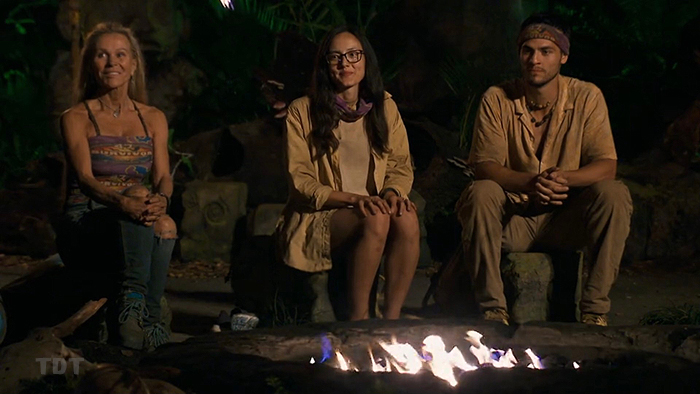
As Rachel alluded to at Final Tribal, her best game-winning trait was her adaptability. She came into the game expecting to play a social/strategic-type game, but ended up on a challenge run instead. Maybe on a season like One World, her castmates would have been more malleable, and she could have done both. But a great Survivor player finds a way to win regardless of the game situation(s) they find themself in, and Rachel did that. Rachel had elite skills in using the tools the show gave her: making the correct choice between Safety Without Power and blocking a vote; playing her Shot in the Dark to gauge whether she needed to play her idol; eavesdropping on her opponents and correctly assessing she did need to play her idol at Final 6; getting a bonus vote-block advantage (and preventing her opponents from doing so) on a journey. Apart from her blindspot (Andy), her reads were impeccable. Together with impressive performance in challenges, Rachel was the complete package here.
As he noted, Sam voted the most people out this season (eight, in eight attempts), and he did have a particularly impressive move on his résumé with Operation: Italy, and he explained (and the edit backed it up) that he'd been planning to do something with Genevieve and the fake idol beforehand. But still, Operation: Italy was obviously a (fun, worthwhile) group effort, and Sam's solo strategic moves had more mixed results. He was blindsided by the Sierra boot, and would have voted incorrectly, if he hadn't lost his vote at the auction. He tried and failed to save Sol. He couldn't keep Kyle in the game as a shield, as he wanted. On the plus side, he battled back from the bottom, didn't give up, and scratched and clawed his way into the finals. Maybe against finalists that didn't include Rachel, Sam's tenacity could have won him the million. A solid showing, regardless.
Sue's long-awaited revelation that she was actually 59 didn't win her any jury votes, probably because (1) 59 isn't that old (she's three years younger than Jeff Probst), and (2) while she was unflaggingly loyal, she didn't really direct any of the strategy, except eventually achieving her season-long goal of voting out Kyle. She was an extremely reliable number for Gabe, Caroline, and Rachel at various points in the game, but that's not really the recipe for winning modern Survivor.
In the end, it was a solid conclusion to an enjoyable season. Rachel winning the final immunity prevented a more surprising outcome, and that was fine. If I were editing the show, I definitely would have gone with Episode 13 being just the final six boot cycle (Andy). There was enough there for a 90-minute episode. Then for the finale, the traditional final five/four/FTC sequence would have worked much better (standard 3-hr length). That would have put two hurdles (F5, F4) in Rachel's way after her impressive idoling out of Andy in Ep13. There would have been more doubt over whether she could actually make it to the end. But Survivor did it differently, and awkwardly tacked the final five round onto the Andy boot for reasons, so ... okay, I guess? It all worked out eventually.
Survivor's homogenized team challenge problem
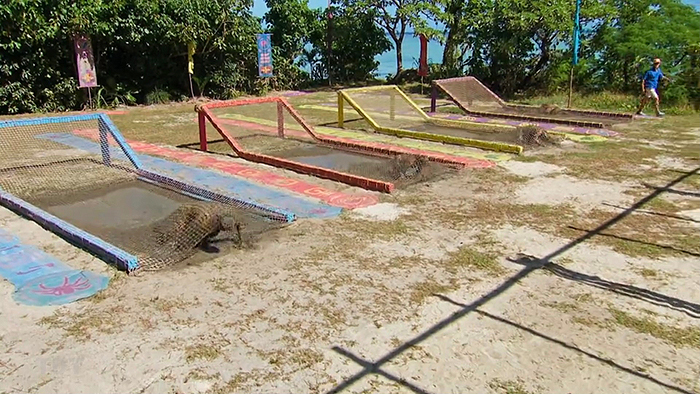
On the one hand, challenges don't really matter all that much. Juries can generally take or leave them. Superfans tend to disdain them. On the other hand, they're a big draw for younger viewers and casual fans. They represent a big part of the "adventure" of the show. So why is new era challenge design so boring, then? It feels like, especially with team challenges, it's fallen into a mud-filled pit, and is struggling to crawl under a net to free itself. (Note: Andy Dehnart at Reality Blurred ran an excellent piece along these lines a week ago, and I have a few thoughts to add, read on.)
The biggest gap between current Survivor team challenges and the classics is that almost every pre-merge challenge now has multiple stages, almost all of which require just one or two people to complete a task at a time. Not only that, but the overall structure is almost always the same: (Stage 1) Obstacle course or strength, then (Stage 2) obstacle course or skill, then (Stage 3) puzzle or skill. There's almost never anything that requires the entire team/tribe to work together. The closest you'll get is a series of tribemates completing the same task individually, one at a time. It's exceedingly rare for the entire tribe to perform a task together. This gives every challenge a similar feeling.
Even worse, sometimes an element will be something that used to be an entire challenge, which seems a bit disrespectful to the original challenge. For example, "Chimney Sweeps" is great as a single challenge, but a scaled-down version of it (or "Uncomfortably Numb") as the third stage in a three-stage reward/immunity challenge, where only three people get to compete? It just feels like a diminution of the original challenge, a cheap knock-off, much as repurposing challenges as duels did in Redemption Island and South Pacific. It's the Temu/Kirkland version of the original.
Probst loves analogies, so here's a relevant one: Modern team challenges are like if you had stew for every meal. Sometimes it's chicken stew, sometimes beef, sometimes veggie. Sometimes there are carrots, or potatoes, or celery. Maybe if you're lucky, you'll have kimchi and gochujang. But it's still always stew. And after four or five times eating variations of the same meal, you'll get pretty tired of it (and we're now at ~7 challenges x 7 seasons = 49 times of it). Challenges that all follow the same basic format are the same way.
There were *some* good choices made this season. The closest we came to a group effort this season was the opening immunity challenge, where paddling a boat was the first task. Gata (who dominated the rest of the challenges) was terrible at it! Another fun group activity was the final task of the Ep2 RC/IC "Rice Race" (during which Rachel attempted her rice heist), where three people had to pull ropes to move a ball through a horizontal snake maze (a task that had previously been a solo effort on a vertical maze, with two ropes). This is the kind of "reinventing how this game is played" that's needed. (And why haven't we seen *that* challenge again? People loved MvGX on Netflix!) More of this, please! But please aim for fewer stages, and more single-concept competitions?
What's an underlying reason for the same-same feel of new era team challenges? One factor has to be that it's always three tribes, and Survivor seems especially reluctant to adapt challenges that were originally designed for two teams to challenges that have three. But it doesn't have to be that way. Take "Dragged Through the Mud," the muddy tug-of-war from Guatemala's Ep2 RC/IC. There's no reason that couldn't work for three tribes. You just need a triangular course, instead of a rectangle. Similarly, take the aforementioned "Idol Hands." There's no reason it couldn't be a three-way battle. Not only that, but Australian Survivor has come up with some fun variants on the original, like the one in Titans v Rebels. Be creative! Think outside the (three-stage, obstacle/skill/puzzle) box!
Instead of the Aftershow, how about...
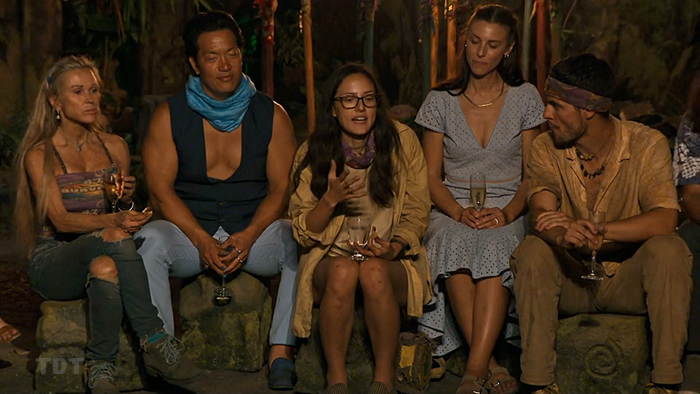
This season's version of the Aftershow was much kinder, much gentler to the losing finalists (and Teeny). That was a huge step forward. But it was also barely there, at 11 minutes total, not counting ads. Jeff Probst took great pains to highlight that he likes this format because it's "pure" and unfiltered by the contestants talking to each other, not colored by the show airing, social media, nothing. That's a fair point, but the Aftershow is still an inferior alternative to a live reunion, and (again) has none of the pre-jurors present. (If those five-to-seven episodes are unimportant, why air them?) Here's how I would fix it:
Go back to a live reunion. I know budgets are tight, and it seems obvious (though Probst will never say so publicly) that CBS doesn't want to spring for it. So cover that by having more sponsors? Product placement? GoFundMe? Let Mike White produce it? I dunno, just do something, be creative! If Sam Phalen can win at fire-making, surely you can try *something*, right? Bringing the cast back together six to 12 months later, having them all dressed up, and seeing how they've fared since the game ended will always be the best celebration of that cast. That means the whole cast, including the pre-jury. And clearly, Jeff Probst himself admits he loves the live audience energy, so it feels like the activation energy barrier can't be that high to clear, right?
So to maintain that "pure" experience in a live reunion setting, just interview every juror and every finalist after Final Tribal (and save the vote reveal for the reunion, as before). Ask every juror the rationale behind their jury vote. Ask every finalist how they think they fared at Final Tribal. Maybe pick one or two jurors as representatives, air those clips after the winner is revealed. Then go back to an hour-long live reunion. Talk to everyone. At least for Survivor 50? Please?
I know, I know, this will fall on deaf ears because it's primarily a budget decision, and the "pure" stuff - while valid - is the smokescreen that's thrown up to distract from it. Honestly, though, I'm fine to start skipping the Aftershow entirely if it's just this format forever. What is even the point of just talking to four people, at least two of whom don't really want to?
Shorter takes
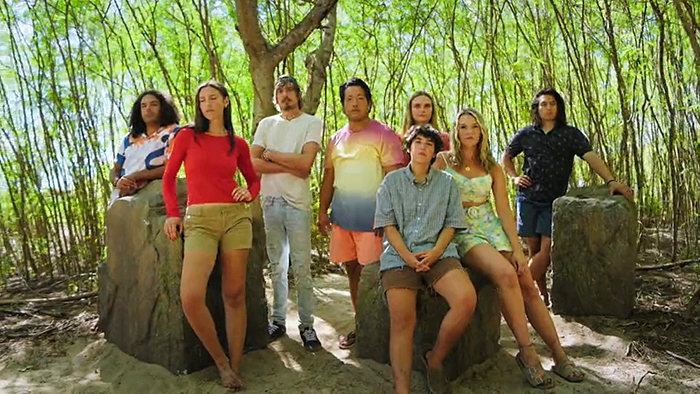
Rites of Passag-zzzzz: I have never loved "Rites of Passage." In its original form, the final 3/4 contestants hiked past a series of torches from their fallen competitors, in the order they were booted, and reflected on their games (usually accompanied by a Final Words-y overdub by that person). It felt very staged and awkward. In the 47 edition, the Final Three were eating their Day 26 breakfast, and talking only about the jurors. This was accompanied by clips of each juror talking about one the finalists. It was ... fine? (The previous iteration with just the jurors talking was better, but I guess someone thought this would fill more time, or something?)
The problem is, this felt just as staged and almost as cringey, although the highlight was Sue asking blankly "who was next?" after each juror, and Sam/Rachel immediately answering in unison. Even for the Gabe-Kyle-Caroline stretch! I was led to believe Sue cared deeply about those boots! (I'm thinking Sue's bit was probably scripted/prodded, but it did foreshadow the jury vote.) Also, this elided all of the pre-jurors, who are (still) absent from the Aftershow, as well. It's like they didn't even exist.
Finally, a seconding of Damnbueno's request for "The Jury Speaks" videos to return, at least as a supplemental/secret scene thing. Finding out what the jurors actually think going into Final Tribal adds a lot of depth to the season. I would also combine it with my suggestion for the Aftershow:
Can I push back on that a bit? Andy claimed at Final Tribal: "If you run the analytics on [Rachel's challenge performance], it's better than Kyle." Well, ahem ... I've run the analytics on it: Rachel's individual challenge prowess was really good (74.5%, which is in the 85th percentile all-time, albeit just short of the leaderboard), but she was clearly not better than Kyle. We had them both in head-to-head challenges several times! Rachel was third out in "Bow Diddley" (Ep6 IC). Kyle won. Rachel was first out for the blue team in "Audio Slave" (Ep7 IC). Kyle won (for his team, 3rd overall). True, we never saw Rachel vs. Kyle on a puzzle, and I would imagine Rachel would outperform Kyle there. But here's some actual analytics: Kyle's Z score in the Mean % Finish in individual challenges (MPF) stat is 2.2 (2.2 standard deviations better than the mean). Rachel's is 1.1. Both really good scores! But come on, Andy.
Those numbers are a bit off ... ? In pumping up Sue's spirits at the Aftershow, Probst relayed some statistics about women over 50: Only 21 have ever been on the show (in 47 seasons), and of those - he claims - five have "made it to the end." I'm not sure what cutoff Probst is using here, but it's not that Sue is one of five 50+ woman finalists. Sue is actually only the fourth woman finalist who's 50+, ever, joining Kim Johnson (56 in Africa), Lill Morris (51 in Pearl Islands), and Carolyn Rivera (53 in Worlds Apart). Why not use that statistic? And what does "made it to the end" mean, if not that? (Hat tip to Australian Survivor's Nick Iadanza on this, especially since my records originally had Kim J's age off by a decade.)
My guess is they're adding in women who reached the finale? Scout Cloud Lee was 59 in Vanuatu, and was the final juror (3rd place). Heather Aldret (then 52) was out via fire and also the final juror, in the finale of Survivor 41. But then that would be six women total with Sue. Maybe whoever compiled this didn't realize Scout's third-place finish in S9 did not make her a finalist? In the words of Rudy Boesch, I dunno.
 Jeff Pitman is the founder of the True Dork Times, and probably should find better things to write about than Survivor. So far he hasn't, though. He's also responsible for the Survivometer, calendar, boxscores, and contestant pages, so if you want to complain about those, do so in the comments, or on Bluesky: @truedorktimes
Jeff Pitman is the founder of the True Dork Times, and probably should find better things to write about than Survivor. So far he hasn't, though. He's also responsible for the Survivometer, calendar, boxscores, and contestant pages, so if you want to complain about those, do so in the comments, or on Bluesky: @truedorktimes
- S47 recaps index
- Ep.1: A fun but still flawed seventh New Era premiere
- Ep.2: A massive peacocking display
- Ep.3: The evolution of New Era strategy
- Ep.4: Collusions of grandeur
- Ep.5: Pay attention to this twist, not that one
- Ep.6: Fiddling while Rome burns
- Ep.7: Turning back time
- Ep.8: Get ready to get happy
- Ep.9: Think big, Survivor
- Ep.10: Live by the edit, die by the edit
- Ep.11: Rachel's big episode
- Ep.12: Could Andy actually win now?
- Ep.13: It's semifinale week on Survivor 47!
- Ep.14: Closing out Survivor 47